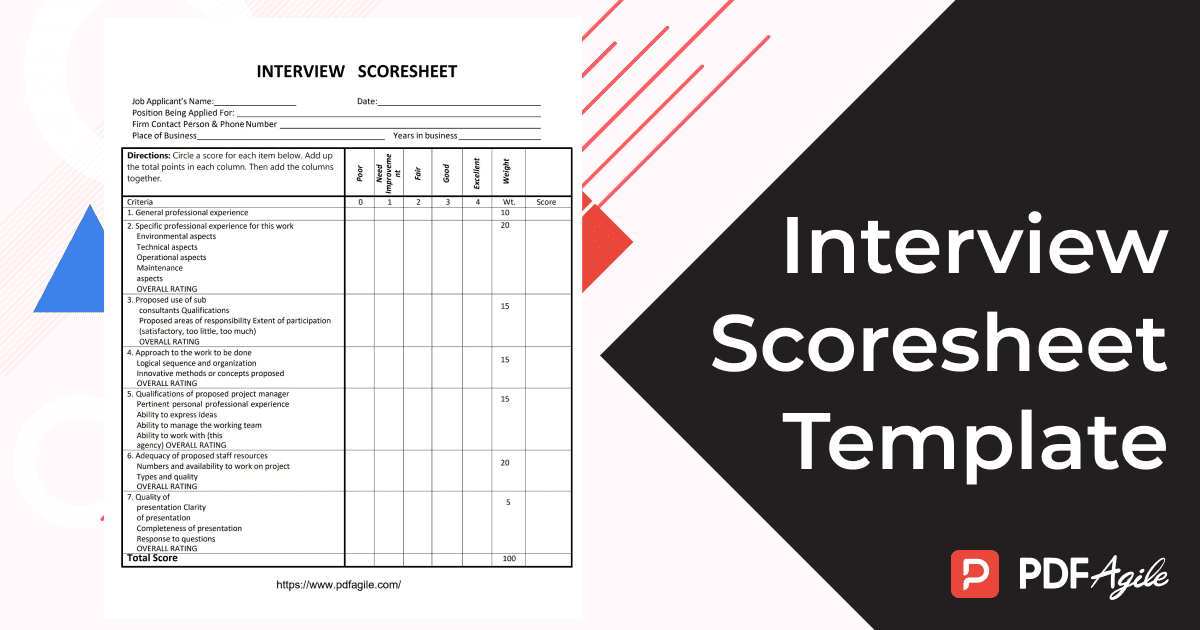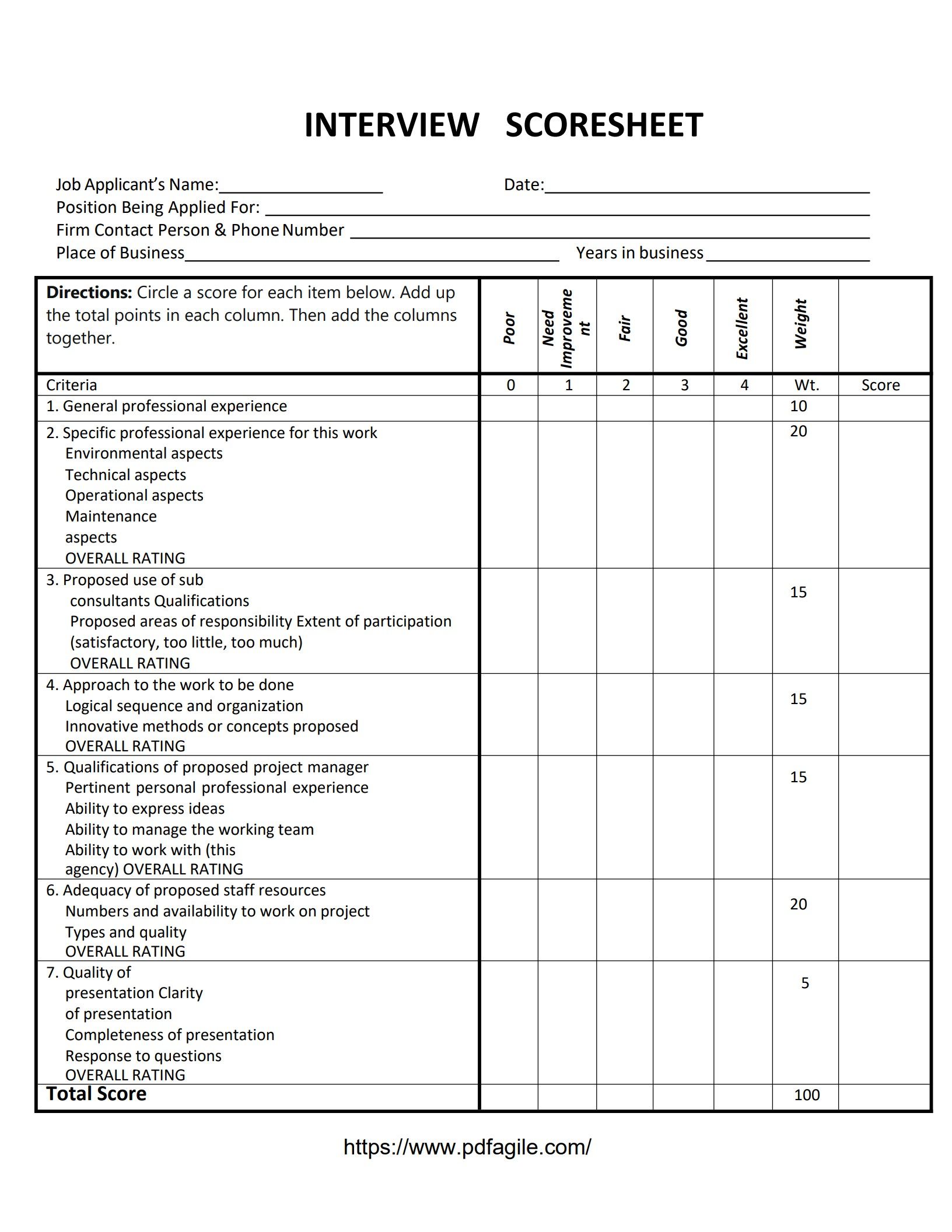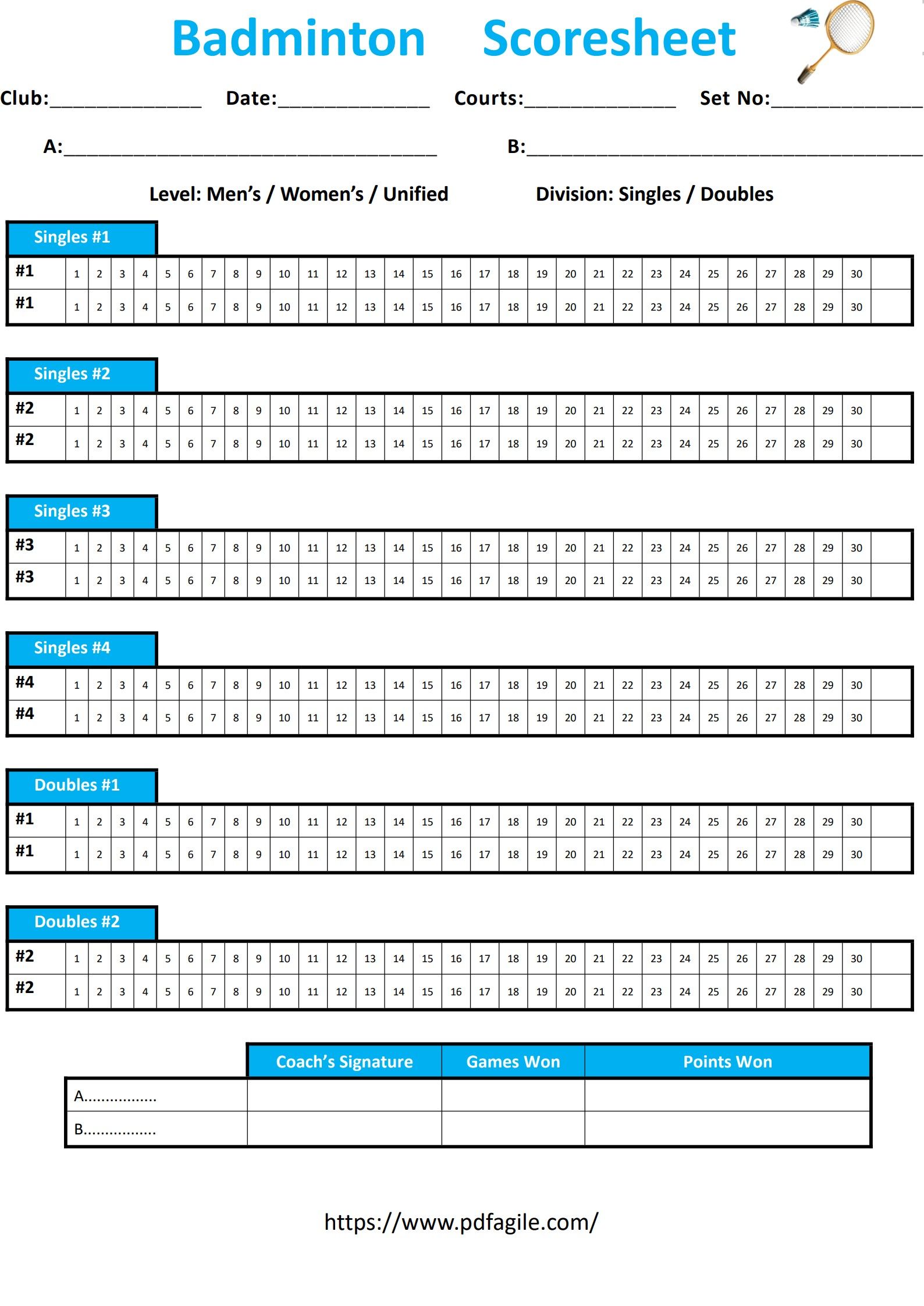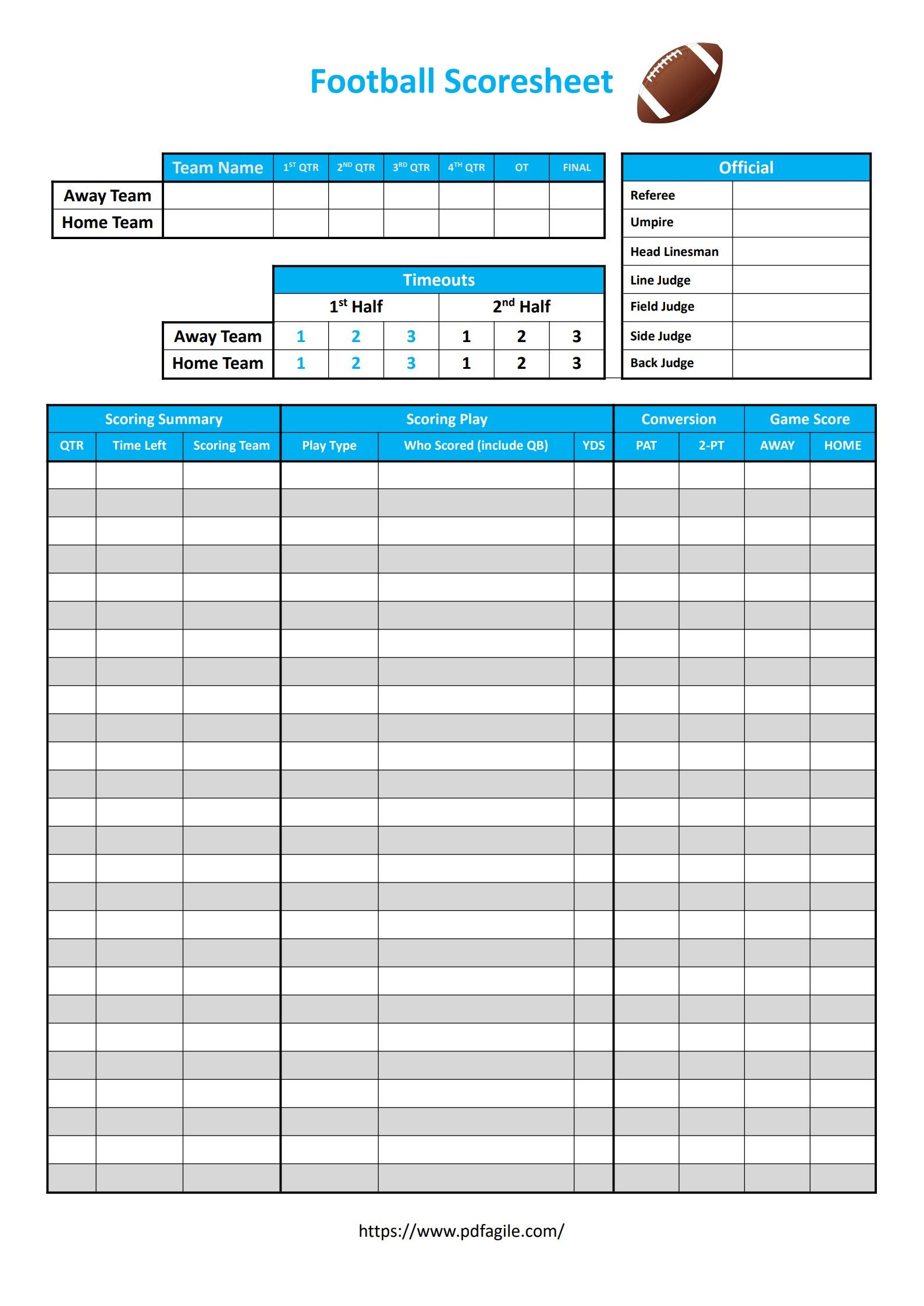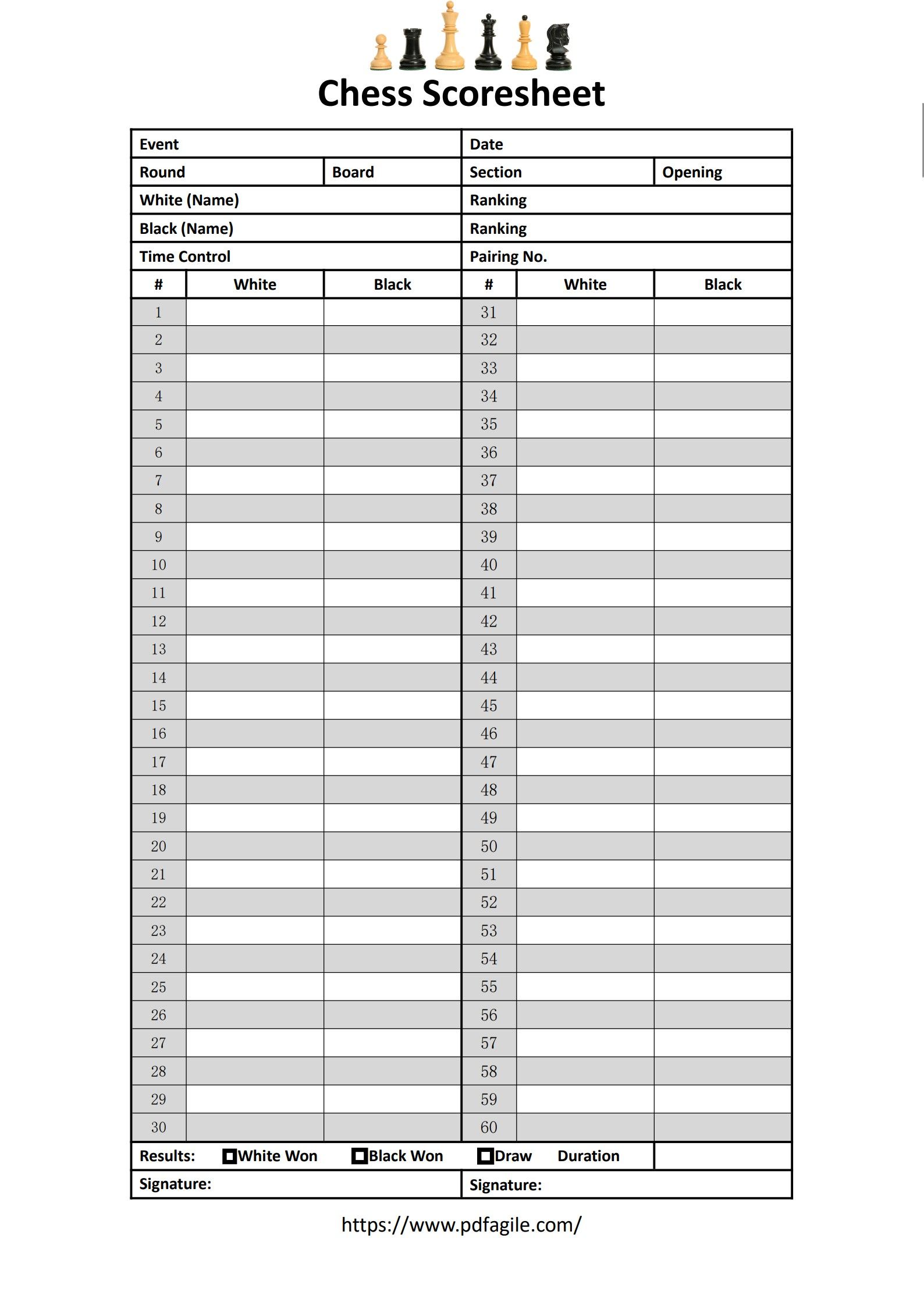Finding the perfect candidate can feel like searching for a hidden gem. You sift through resumes, conduct interviews, and weigh countless factors. But what if there was a tool to streamline this process, ensuring a fair and objective evaluation of every applicant? Enter the interview scoresheet – your secret weapon for making informed hiring decisions.
This guide will equip you with the knowledge to utilize the interview scoresheet effectively. We'll explore its benefits, delve into its key components, and provide practical tips for maximizing its impact. By implementing a standardized evaluation system, you'll transform your hiring process from a guessing game to a data-driven success story.
What is an Interview Scoresheet?
Finding the perfect candidate can feel like navigating uncharted territory. An interview scoresheet acts as your compass, guiding you towards a well-informed hiring decision. But what exactly is it?
In simpler terms, an interview scoresheet is a standardized tool used to assess candidates during the interview process. It provides a structured format for evaluating them based on pre-defined criteria, ensuring consistent and objective analysis across all applicants.
Think of it as a shared evaluation map. Here's how it functions:
- Structured Approach: The interview scoresheet outlines key skills and qualities relevant to the position. This structure ensures all candidates are assessed based on the same essential factors.
- Defined Criteria: Each skill or quality becomes an "evaluation criteria" listed on the sheet. This might include technical expertise, communication abilities, problem-solving skills, and cultural fit.
- Standardized Ratings: For each criterion, the scoresheet provides a rating scale – often a numerical scale (e.g., 1-5) or descriptive labels (e.g., "Needs Improvement" to "Exceeds Expectations"). This standardization allows interviewers to assign consistent scores across different candidates.
The interview scoresheet goes beyond just numbers. It can also include:
- Notes Section: Space for interviewers to jot down specific observations, examples of the candidate's skills in action, or questions for further discussion. This richens the evaluation process and helps with later comparisons.
Benefits of Using an Interview Scoresheet
The interview process can be a whirlwind of resumes, conversations, and candidate evaluations. Here's how an interview scoresheet helps navigate this critical stage, ensuring fair assessments and a well-informed hiring decision:
- Level Playing Field: Interview scoresheets promote objectivity and consistency by providing a structured framework for evaluating candidates. Everyone is assessed based on the same pre-defined criteria, eliminating the risk of bias based on first impressions or personal preferences. This ensures a fair chance for each candidate to shine based on their relevant skills and experience.
- Clarity and Organization: Say goodbye to scattered notes and subjective impressions. Interview scoresheets offer a clear and organized format for recording observations and assigning scores. Each criterion, whether it's technical expertise, communication skills, or cultural fit, has a dedicated space for evaluation. This ensures all aspects relevant to the position are comprehensively considered and documented, minimizing the chance of overlooking crucial details.
- Collaborative Power: Hiring isn't a one-person show. Interview scoresheets facilitate communication and consensus among interviewers. With a central platform for documenting evaluations, interviewers can easily compare notes and discuss their observations. This collaborative approach fosters a more well-rounded understanding of each candidate, leading to informed hiring decisions that benefit the entire team.
Interview Scoresheet Basic Format
A well-designed interview scoresheet is the foundation for a fair and effective hiring process. It ensures all candidates are evaluated on the same criteria and provides a clear picture of their strengths and weaknesses. Here's a breakdown of the essential components that make up a solid interview scoresheet:
- Candidate at a Glance: Dedicate a section to capture basic candidate information like name, position applied for, and interview date. This ensures quick reference throughout the evaluation process.
- The Evaluation Compass: Criteria & Weightings
- Defined Criteria: This core section outlines the specific skills, experience, and qualities considered essential for the role. These criteria should be pre-determined based on the job description and company culture.
- Weighted Importance: Not all criteria are created equal. Assign a weight to each criterion to reflect its relative importance for the position. For example, "Technical Skills" might hold a higher weight for a software developer role compared to "Teamwork" skills.
- Rating with Clarity: The Scoring System
- Standardized Scale: Provide a consistent and easy-to-understand scale for interviewers to rate each criterion. A common approach is a numbered scale (e.g., 1-5) with clear descriptors for each level (e.g., 1 - Needs Improvement, 5 - Exceeds Expectations).
- Behavioral Anchors: Consider adding brief behavioral descriptions for each level of the rating scale. These anchors provide interviewers with concrete examples of what each level might look like in practice, ensuring consistent interpretations.
- Capturing the Details: Notes Section
- Space for Insights: Leave ample space for interviewers to record specific observations, examples, and key takeaways from the interview. These detailed notes can be invaluable for later discussions and candidate comparisons.
- Open-Ended Prompts: Include some open-ended prompts within the notes section to encourage interviewers to capture specific aspects of the candidate's performance, such as communication style or problem-solving approach.
- Overall Picture: Some scoresheets may include a dedicated section for calculating an overall score based on the individual criteria ratings and their assigned weights. This can be a helpful tool for quick comparisons, but remember, a well-rounded evaluation goes beyond a single number.
How to Utilize the Interview Scoresheet?
The interview scoresheet is your weapon against subjectivity and a shield for consistent candidate evaluation. Here's how to leverage its power during the interview process:
Before the Interview: Setting the Stage for Success
- Standardization is Key: Select a scoresheet template that aligns with the specific position's requirements. This ensures all candidates are evaluated based on the same relevant criteria.
- Define Your Rubric: Clearly define the evaluation criteria for each section of the scoresheet. These criteria should reflect the skills, experience, and behaviors essential for success in the role. Assign weights to each criterion if desired, reflecting its relative importance in the overall evaluation.
- Calibrate Your Team: If multiple interviewers are involved, schedule a pre-interview discussion. This ensures everyone understands the evaluation criteria, scoring scales (e.g., 1-5 with clear descriptors), and any specific behavioral examples you'll be looking for during the interview. Consistent understanding minimizes bias and promotes fairness.
During the Interview: Capturing Candidate Strengths and Weaknesses
- Independent Evaluation: During the interview, each interviewer should independently evaluate the candidate based on the pre-defined criteria.
- Score and Support: Assign scores using the established rating scale for each criterion. Jot down specific examples or behaviors that support your rating in the notes section. This strengthens the objectivity of your evaluation and provides valuable talking points for later discussions.
- Active Listening: While taking notes, actively listen to the candidate's responses and ask clarifying questions to fully understand their qualifications and experiences.
After the Interview: Collaborative Decision-Making
- Team Huddle: Once the interview concludes, interviewers should convene to discuss their assessments.
- Compare Scoresheets: Share your completed scoresheets and discuss the rationale behind your ratings. This allows for a holistic understanding of the candidate's strengths and weaknesses.
- Consensus Building: Through open discussion, strive to reach a consensus on the candidate's overall suitability for the role. The scoresheet serves as a valuable data point in this decision-making process, but don't be afraid to consider qualitative aspects beyond the numerical ratings.
Tips for Using an Interview Scoresheet
The interview scoresheet is a powerful tool, but like any tool, it requires proper handling to maximize its effectiveness. Here are some tips to ensure your scoresheet helps you identify the best candidate, not create confusion:
- Calibrate Your Team: Pre-interview discussions are crucial, especially when multiple interviewers are involved. Ensure everyone understands the evaluation criteria and scoring scales before meeting the candidate. This minimizes subjectivity and promotes consistent evaluation across the board.
- Focus on Behaviors, Not Just Words: The scoresheet should go beyond simply recording answers. Use the notes section to document specific examples of the candidate's skills and behaviors that support your ratings. Did they showcase strong problem-solving skills during a hypothetical scenario? Note it down! These concrete examples strengthen the objectivity of your evaluation and provide valuable talking points for later discussions.
- Beware the Halo and Horn Effect: Be mindful of unconscious bias. Don't let a strong first impression (halo effect) or a minor misstep (horn effect) cloud your judgment. Evaluate each criterion independently, focusing on the candidate's overall suitability for the role.
- Maintain Confidentiality: Treat completed scoresheets with appropriate respect. Store them securely and only share them with authorized personnel involved in the hiring process. Remember, the candidate's information deserves privacy.
- The Scoresheet is a Tool, Not a Master: The interview scoresheet is a valuable guide, but it shouldn't dictate the final decision. Use the scoresheet alongside your own observations and discussions with other interviewers to reach a well-informed conclusion. Remember, the best candidate might not always have the highest numerical score.
Free Download: Printable Interview Scoresheet Template
To help you get started, we have created a free, printable interview scoresheet template. You can download the template by clicking the Use Template button on this page.
You can also explore more scoresheet PDF templates in PDF Agile Templates Center.
